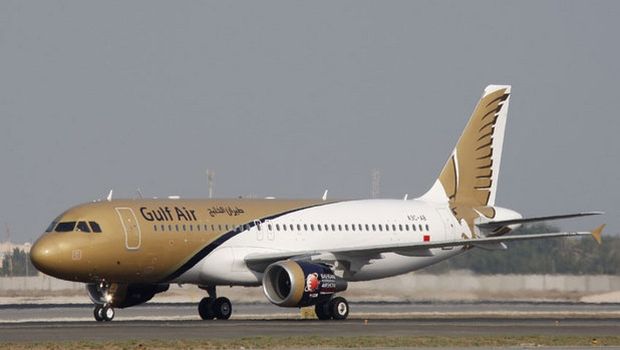Manama, Asharq Al-Awsat—Bahrain’s national carrier, Gulf Air, is looking to enter into strategic alliances with a number of other companies within the aviation sector in order to provide a more comprehensive roster of commercial aviation services going beyond passenger and cargo travel, according to its chief executive.
Speaking to Asharq Al-Awsat on Wednesday on the sidelines of a media roundtable to discuss Gulf Air’s annual results for 2013, Maher Salman Al-Musallam said the airline is hoping to eventually set up a holding company to encompass all commercial aviation activities in Bahrain, including the operation of the country’s airport and ground services.
This comes as Gulf Air posted its strongest financial results in years, shrinking its annual losses in 2013 by 52 percent—or 100 million Bahraini dinars (265 million US dollars)—and surpassing its restructuring target by 14.5 million dinars (37 million dollars). The airliner also reduced its costs 28 percent year-on-year and increased passenger yields by 14 percent.
Gulf Air has suffered steady losses in the last number of years, but these have now been brought down to “an acceptable level,” according to Musallam. In December 2012 the airliner began a restructuring plan to turn around its fortunes, after being told by the Bahraini government to pare down operations or risk closure.
Speaking at the media roundtable on Wednesday, Bahraini Deputy Prime Minister and Gulf Air Chairman Sheikh Khalid Bin Abdullah Al Khalifa said that “the company [Gulf Air] had almost shut down in 2012” but that since then, with the help of a 492-million-dollar bailout from the Bahraini government, it had “delivered an unprecedented turnaround.”
As part of the 2012 restructuring plan the carrier laid off 27 percent of its workforce, renegotiated some 2,000 costly supplier contracts, cut eight loss-making routes, and retired an ageing fleet of 14, mainly Boeing, aircraft.
Its existing fleet now consists of 26 Airbus planes with an average age of 5.7 years—the lowest on both counts in its 64-year history—and it has added five new routes in the Middle East, Africa and Asia, as well as a new route to Athens.
It also recently announced it would be revamping its Airbus A330 fleet—used mainly in its long-haul flights to Bangkok and London—by introducing flat beds for business class and improving its economy class services, as well as upgrading its in-flight entertainment services.

